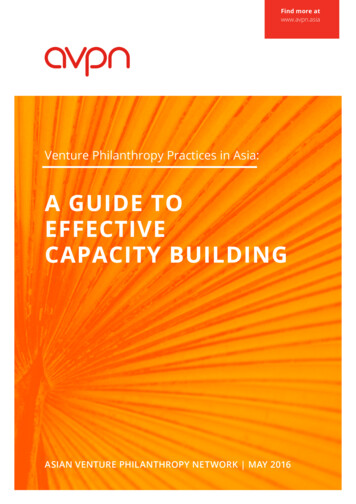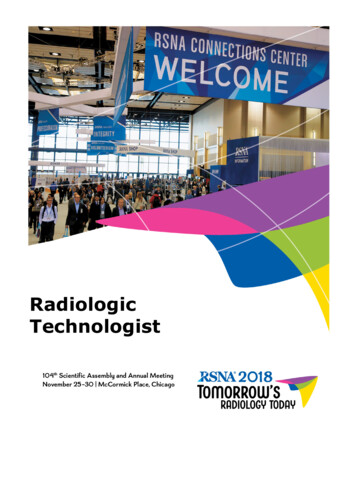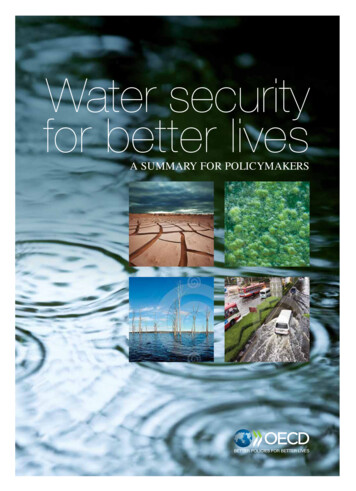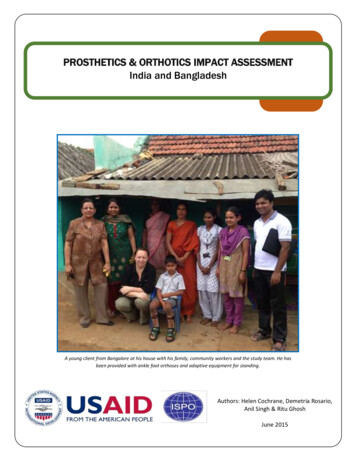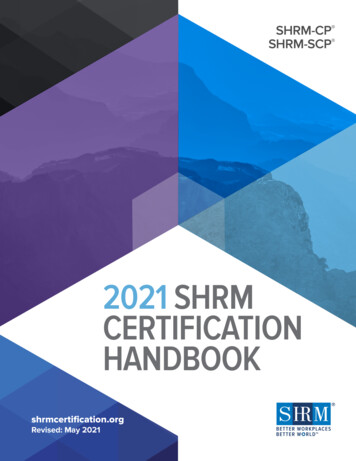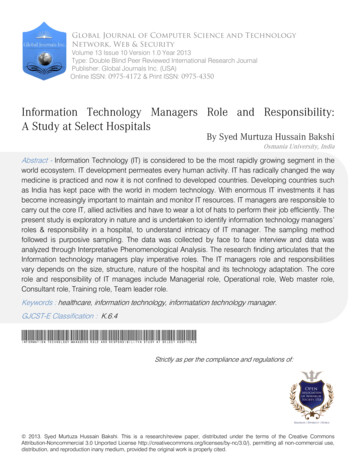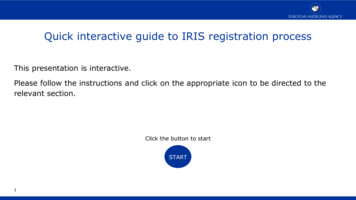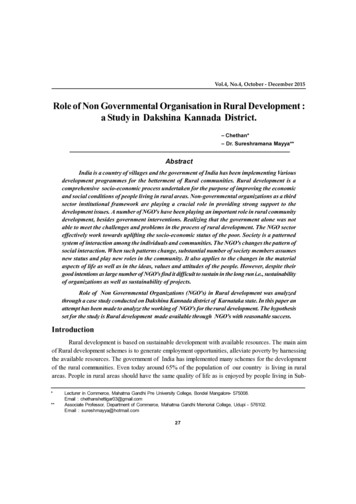
Transcription
Vol.4, No.4, October - December 2015Role of Non Governmental Organisation in Rural Development :a Study in Dakshina Kannada District.– Chethan*– Dr. Sureshramana Mayya**AbstractIndia is a country of villages and the government of India has been implementing Variousdevelopment programmes for the betterment of Rural communities. Rural development is acomprehensive socio-economic process undertaken for the purpose of improving the economicand social conditions of people living in rural areas. Non-governmental organizations as a thirdsector institutional framework are playing a crucial role in providing strong support to thedevelopment issues. A number of NGO's have been playing an important role in rural communitydevelopment, besides government interventions. Realizing that the government alone was notable to meet the challenges and problems in the process of rural development. The NGO sectoreffectively work towards uplifting the socio-economic status of the poor. Society is a patternedsystem of interaction among the individuals and communities. The NGO's changes the pattern ofsocial interaction. When such patterns change, substantial number of society members assumesnew status and play new roles in the community. It also applies to the changes in the materialaspects of life as well as in the ideas, values and attitudes of the people. However, despite theirgood intentions as large number of NGO's find it difficult to sustain in the long run i.e., sustainabilityof organizations as well as sustainability of projects.Role of Non Governmental Organizations (NGO's) in Rural development was analyzedthrough a case study conducted on Dakshina Kannada district of Karnataka state. In this paper anattempt has been made to analyze the working of NGO's for the rural development. The hypothesisset for the study is Rural development made available through NGO's with reasonable success.IntroductionRural development is based on sustainable development with available resources. The main aimof Rural development schemes is to generate employment opportunities, alleviate poverty by harnessingthe available resources. The government of India has implemented many schemes for the developmentof the rural communities. Even today around 65% of the population of our country is living in ruralareas. People in rural areas should have the same quality of life as is enjoyed by people living in Sub***Lecturer in Commerce, Mahatma Gandhi Pre University College, Bondel Mangalore- 575008.Email : chethanshettigar03@gmail.comAssociate Professor, Department of Commerce, Mahatma Gandhi Memorial College, Udupi - 576102.Email : sureshmayya@hotmail.com27
SUMEDHA Journal of Managementurban and Urban areas. Further there are cascading effect of poverty , unemployment, poor andinadequate infrastructure in rural areas on urban centre causing slums and consequential social andeconomic tensions manifesting in economic deprivation and Urban poverty. Hence Rural developmentwhich is concerned with economic growth and social justice , improvement in the living standard ofthe rural people by providing adequate and quality social services and minimum basic needs becomesessential.Non Governmental Organizations with their advantage of Non Rigid, locality specific , felt needbased, beneficiary oriented and committed nature of service have established multitude of roles whichcan effect rural development. NGO's in recent days have been emerged as an important element ofcontemporary rural society and alike between in the grass roots and civil society. The voluntary sectorhas contributed significantly in reducing poverty, deprivation or discrimination and exclusion throughawareness, social mobilization, service delivery and training. They are the effective non political linkbetween government and common people.Non Governmental Organizations play an important role in the efficient and cost effectiveprovisioning of services, in mobilizing communities and groups and thereby providing effective channelsof communication between the government and the people , and the implementation of programmesrequiring innovative approaches.The Government , because of its command over and access to much greater resources andworking under a broader institutional framework, has the potential for designing and implementingsuitable programmes to reach much wider sections of the poor. Non Governmental Organisations onthe other hand , have several advantages over government organizations in the provision of assistanceto the rural poor, and this aspect needs to be given due recognition. Their close contact with the poor,willingness to spend more time on the various experiments and their ready acceptability by society,given them an edge over the government. While Non Governmental Organisations may have thecapacity to access the poor better, governments are still required to initiate suitable changes to enablesustained expansion of the economy.Aims and objectives of NGO NGO's aim at improving the standard of living and value systems of rural people. They provide financial assistance for people to develop themselves. NGO's play a important role in empowering the rural poor such as women, Children's etc. NGO's promote people centered development through education program. NGO's countervail the debilitating aspects of development and democracy in rural areas. NGO's put effort for the development of civic amenities in rural areas.28
Vol.4, No.4, October - December 2015 It encourages and implements the use of new technologies in rural areas. NGO's play an effective role in poverty alleviation and employment generation. They fight against corruption and anti-social practices. NGO's promotes development of agriculture and small scale industry. It promotes ecology and tribal development and environmental protection and education.Growth of NGO's in IndiaThe government of India, recognizing the need to supplement its own efforts to promote ruraldevelopment and poverty eradication. Since the government programmes were not having the desiredimpact in rural areas, it was felt that NGO's could play a leading role in rural development throughdirect implementation of interventions around specific issues.The growth of Non Governmental Organisations in India had roots in the pre-independenceperiod and in the social reform movements of the late 19th century. During this period a number ofindividuals and associations were involved in social service, such as helping the poor and the destitute,as well as social reform against practices such as blind beliefs which are availed in rural areas. Christianmissionary groups also contributed to the growth by setting up a network of hospitals, schools andwelfare services for the poor. The Gandhian approach clubbing village development programs withsocial reform contributed largely to the growth of the voluntary sector.According to PRIA (Society for participatory Research in Asia, New Delhi, 110062) survey it isestimated that there are 1.2 million Non Governmental Organisations in India . The Non Profit Organisationssector in India is predominantly rural based. More than half of the NGO's in the country are based inrural areas. Of course , several NPO's( Non Profit Organisations ) located in Urban areas serve ruralcommunities. Nearly half of the NGO's are unregistered. In India the percentage of registered NGO'sis highest in Maharashtra (74%) and lowest in Tamil Nadu (47%). An overwhelming majority of theseregistered NGO's are registered under Society Registration acts. Most of the unregistered NGO's are inRural areas but even in urban Delhi, nearly 30% of NGO's are not legally registered.The following is an estimate of the types of NGO's based on their activities, there are fourdominant activities at the all India levelTable 1 : Distribution of NGO's on the basis of their ActivitiesActivitiesReligion BasedEducationSports/ CultureHealthPercentage26.5%20.4%18.0%6.6%29
SUMEDHA Journal of ManagementThe impact of NGO's on social development varies in different countries. While NGO's have astrong influence in some countries, they are relatively weak in others. In India, many NGO's sufferfrom lack of credibility and are yet to gain full acceptance of the government. The relationship betweenNGO's and the government has both potential benefits and risks. A healthy relationship is possible onlywhen there are commonly shared objectives regarding social development. However, even when suchconditions are met, experience has shown that the main problem with the relationship between NGO'sand the government seems to be one of mutual distrust. Further, which closer collaboration may helpto expose governments to a grassroots perspective by working closely with local communities.Review of LiteratureReview of literature has not only widened the horizon of understanding the themes related to thestudy, but also has sharpened the method of arranging the components in the framework of the study.Role of Non Governmental Organisations in Rural development were addressed by researchesand some important studies are reviewed below.1.A study by Misra, Rajeeb.(2008). The role of NGO's is not to carry out development work inisolation , but through a " Participatory approach" through working with the people. NGO's areessentially grassroots institutions that work closely with local communities2.A study by Mehta, Ajay,S.(1996). on the involvement of Seva Mandir , a Non GovernmentalOrganisation based in Udaipur described the efforts of the NGO's to countervail the debilitatingaspects of development and democracy in two villages - Nayakheda and Shyampura.Transparency, credibility and team building were the major factor that accounted for theirachievement of goals by empowering the local community collectively. It was a success storyasserting the vital role of the NGO in mobilizing the power of the poor.3.Laxmi, & Archana. (2005). In their study they states that the role of NGO's in reaching thepoorest is limited and most of the income generating activities facilitated and promoted by theNGO's. They generate income which forms only a small proportion to the total income of thefamily members.4.Ranjith, Guptha.made a case study of two Non Governmental Organisations, namely theassociation of Sarva Seva Farms (ASSEFA) and the Mysore Resettlement and DevelopmentAgency ( MYRADA) with the objective of assessing their approaches, strategies and impacton rural development programs both were well known organizations committed to the cause ofupliftment of the rural poor and the landless labourers.5.Sarojini.(2004). made a study on the vital role of NGO's in educating Rural women for ruraldevelopment.30
Vol.4, No.4, October - December 2015Objectives of Present Study1.To identify the role of NGO's in rural development.2.To analyze the social, Personal and economical changes of members after joining NGO.Research MethodologyFor the present study, a few NGO's have been selected randomly for detailed investigation andrelevant information was collected by personal visits and through telephones . the researcher personallycame across with many NGO's which are acting upon to improve conditions of rural areas. Theincreasing membership of rural people in NGO's and the changes took place among the membersmotivated the researcher to take up this study.In this study 10 NGO's were randomly selected from out of the pool of NGO's which arelocated, in Dakshina Kannada district. The total samples constitutes 100 i.e. 10 members from eachNGO using purposive sampling method . The study is based on Primary data and Secondary data,Published articles. Primary data is collected through interview method. This study is specially adescriptive one it aims at describing the role of NGO's in rural development.The overall analysis of the study reveals that NGO's are playing an effective role in bettermentof rural communities.Data Analysis and DiscussionsTable 2 : Distribution of Beneficiaries on the basis of ageSl No123456AgeBelow 20 years20-3030-4040-5050-60Above 60 yearsTotalNo of Beneficiaries2213824123100Source : Primary Data31Percentage2213824123100 %
SUMEDHA Journal of ManagementTable :2 Shows the Age wise distribution of Beneficiaries who are engaged in the NGO activities.The above table states that around (38 %) of the members who are getting the benefit from NGO'sare belongs to the 30-40 age category and we can find very minimum members in the NGO's arebelongs to above 60 years and below 20 years.Table 3 : Distribution of Beneficiaries on the basis of their Educational StatusSl No123456Educational StatusIlliteratePrimary EducationS.S.L.CP.U.CDegreeAny otherTotalNo of Beneficiaries344217601100Percentage344217601100 %Source : Primary DataTable 3. Shows that most of the beneficiaries around (42%) have studied up to Primary educationand majority of the beneficiaries are below S.S.L.C and (34%) are Illiterates. The people who havecompleted S.S.L.C , PUC and Degree level education were able to get the good job or they can go forSelf Employment . But the people who are deprived from the formal education or had little educationfinds difficult to get the good job or their own Self Employment.This study reveals that the majority of the Beneficiaries who are the members of NGO's arehave the educational background of Primary or most of them are Illiterates and they are leading asecured life being the members of NGO's.Socio-Personal and Economic ChangesThe change implies all variations in human societies . when changes occur in the modes ofliving of individuals and social and personal relation gets influenced .The NGO's play an very important role in the Socio- personal changes of the rural people by32
Vol.4, No.4, October - December 2015providing the various facilities to the rural poor .Socio-personal changes refers to the modifications whichtake place in life pattern of people it occurs because all societies are in a constant state of disequilibrium.The NGO's are promoting the habit of savings among the rural people through their severaldevelopment programs. This will leads to increase in the standard of living and economical conditionsof the rural society.Table:4. Objective of Beneficiaries behind joining NGO'sSl No12345ObjectiveEmployment OpportunitySavingsLoan purposeSelf DevelopmentOthersTotalNo of Beneficiaries135118117100Percentage135118117100 %Source : Primary DataObjective behind joining NGO'STable 4. Reveals the objective of Beneficiaries behind joining NGO's . Majority of the beneficiaries(51%) are joined NGO's in order to save the money and (18% ) of them joined for getting loan . Only13% of the Beneficiaries are joined to get the employment opportunities and very few (11% ) ofthem joined for self development. Savings increases the Self confidence of the individuals and theNGO's plays an important role in creating the habit of savings among its members.Hence, This study reveals that, majority of the Beneficiaries are joined NGO's for savingpurposes.33
SUMEDHA Journal of ManagementTable 5 : Savings details of BeneficiarySl No12345InstitutionsBanksNGO OfficesPost OfficeGovernment OrganizationsOthersTotalNo of Beneficiaries7651234100Percentage7651234100 %Source : Primary DataTable .5 Explains the saving details of the beneficiaries. The majority of the beneficiaries (76%)save their money in Banks and around (12%) of them are save in Post offices. Only few (5%) of thebeneficiaries are have the savings accounts in NGO offices. This shows that most of the members ofNGO's are trying to save money for better standard of living. Savings not only provides security to lifeand it also gives the encouragement to lead the Individual entrepreneurship or Self employment .This study reveals that, due to the revolutionary activities of the NGO's they are successful topromote the habit of savings among the members. Savings contributes to changes in economicconditions, social status and decision making power of the Individuals.The below table 6 shows that (42%) of the Beneficiaries have the opinion that their standard ofliving that means their personal Income has been increased in better extent and (31%) of Beneficiarieshave the opinion that they have developed their Personality and Decision making power. Around(27%) of beneficiaries have the opinion that they have the improved social relationship and status inthe society.34
Vol.4, No.4, October - December 2015Table 6 : Socio-Personal and Economic Changes of Beneficiaries after joining NGO'sSl No123ChangesSocial StatusIncrease in IncomePersonality developmentTotalNo of Beneficiaries274231100Percentage274231100 %Source : Primary DataThe present study reveals that, The NGO's are able to provide a better quality of life andstandard of living to the members. The table reveals a positive development in economic and socio Personal conditions of the members.Table 7 : Increase in financial status of Beneficiaries after joining NGO'sSl No12OpinionYesNoTotalNo of Beneficiaries9307100Percentage9307100 %Source : Primary DataTable 7 shows Increase in financial status of Beneficiaries after joining NGO's. Majority of thebeneficiaries( 93%) had opined that their financial status is increased after joining NGO's. Very few(7%)had opined that they are not able to get the better financial support from the NGO's.This study shows that NGO's are playing a significant role in improving economic status of thebeneficiaries.35
SUMEDHA Journal of ManagementTable 8 : Working status of BeneficiariesSl No12345678Working StatusSelf EmploymentCoolieBeedi RollingGovernment EmployeeCattle breedingfarmingSmall RetailingAny otherTotalNo of 05150706100 %Source : Primary DataWorking status of BeneficiariesTable 8 Explains working status of the beneficiaries. The table shows that 31% of beneficiariesare have chosen Self employment and (23%) of the respondents are the coolie workers, (15%) ofthem are working as farmers and (12%) beneficiaries are engaged in Beedi rolling . Some of thebeneficiaries are taken cattle breeding and some of them have small retail shops.This shows that the Non Governmental Organizations are successful to create the awareness ofthe Self employment among the members and also made them to follow it. Majority of the membersare self employed and they are getting regular income to lead their family. During the earlier dayspeople are preferred to do work on the basis of their cast and creed. But now the entire situation hasbeen changed due to the intervention of the Non Governmental Organizations. they provide propertraining and good education facilities to the members according to their skill and knowledge .Findings of the Study1.Non Governmental Organizations play an important role in rural development by providingbetter facilities to the rural society.2.Non Governmental Organizations are successful to create the awareness of Self employmentamong the members. The present study reveals that most of the beneficiaries are independentand they are trying do the self employment and other employment opportunities by taking thehelp of NGO.3.NGO's have the ability to reach poor communities , remote areas and areas where governmenthave failed to reach , with limited resources and infrastructure.4.They also promotes the habit of savings among its members this will leads to increase in thepersonal income of members. In this study most of the members are started to save the moneyin banks , Post offices and in other institutions for their better future.36
Vol.4, No.4, October - December 20155.They played an significant role in increment of the financial status of the members They alsogrant loans and other financial assistance to the needy members of the NGO's in order tosecure their lives from financial crisis.6.In the present study majority of the NGO beneficiaries are having primary education and alsomost of them are illiterates. This shows that NGO's are working as a powerful tool in solvingthe most of the problem of rural poor who are uneducated or having less education.7.Non Governmental Organizations plays a crucial role in personality development of theindividuals. By their various programmes It encourages the members to develop themselvesand to get the better lives and good status in the society.8.NGO's study local needs and cater to these needs by adapting existing technologies and usinginnovative approaches.Suggestions Most of the NGO's facing the problem of financial assistance they are not getting proper grantsand financial assistance from government and this will make delay in providing the economicalaids to the rural poor so the government should provide a proper financial grants to NGO's atright time without any delay. Many NGO programmes are not designed in such a manner as to bring about sustainedbehavioural change. because of this many people do not have the proper knowledge of benefitwhich they can get from NGO's. Thus it should undertake corrective measures to inform theneed and importance of the NGO's to the rural poor. NGO's are responsible for the funds which they are granted to the beneficiaries. They shouldproperly monitor all the financial activities of the NGO's. Most of the NGO members are Self employed .So NGO's should encourage them to be a selfsupportive by creating their own means of finance. Since the socio-economic conditions of Society is changing day- by -day it is suggested thatNGO's should undertake the new projects, schemes and other development activities whichshould be suitable for changing scenario of the society and people. The activities and programmes of NGO's are too localized to be replicated on a regional ornational scale.ConclusionThe overall analysis of the study reveals that the NGO's are playing an important role inpromoting and implementing the different developmental programmes in rural areas. The NGO's cancontribute to changes in economic conditions, social status and personal development of each individual.37
SUMEDHA Journal of ManagementThe role of NGO's is not to carry out development work in isolation , but through a "participatoryapproach" through working with the people. NGO's are essentially grassroots institutions that workclosely with local communities. NGO's provide training to develop the skills of their members and toeducate the public, especially the depressed sections of society, on their rights. They promote thehabit of saving and they work hard to provide a secured life to the rural poor through generating selfemployment. Besides NGO's face the several problems like lack of funds, grants from the governmentand donors, lack of resources, lack of coordination among the members will cause the problem ofdelay for the implementation of development programmes .So the government should give more importance for the development of NGO 's and theyshould provide proper financial support and other resources at right ddaraju, V.G.(2011).Role of Non Governmental Organizations in promoting sustainable agriculturedevelopment in Karnataka. International NGO Journal, Vol.6(2), pp.057-061.doi:10.5897/NGOJ 10.043.Chandrashekar, H.M., & Lokesh, M.U.(2009).Role of SHGs in Socio-Economic change of VulnerablePoor. International Ngo journal, Vol 4(4), pp 127-131.Khatibi, Farzaneh Shaikh., Yamakanamardi, Sadanand M.,& Indira, M.(2008). Can NGO's play a PositiveRole in Involvement of women in conservation of Lakes? Opportunities and Constraints.Parameshwara, Dr Raghurama, A. Social Entrepreneurship and its contribution to Rural Economic Development.Ramachandran, T.,& Seilan, A.(2005). Socio economic empowerment and SHG's. Social welfare, Vol 52. Pp. 3-7.Dadhie, C.L.(2001). Micro finance - A case study of Oriental Grameena Project in India.Parthasarathy, Vimala.(2012). Social Marketing strategies & Tarits of successful NGO's - A StrategicPerspective. Phd Thesis, Section 5 to 12.Bhaskar, Indu., & Geethakutty, P.S.(2001). Role of Non-Governmental Organisations in RuralDevelopment: A case study. Journal of Tropical Agriculture, Vol .39 , pp. 52-54.Dr. Sharma, Neeraj.(2010). Anti- Poverty Programmes in Rural India. New delhi: Deep & Deeppublications Pvt. Ltd.Prabhakara, K.V(2012). Micro finance Empowers women Evidence from India NGO. Research Journal,Volume II , Issue II.Mehta, Ajay,S.(1996). Micro Politics of Voluntary Action: An Anatomy of change in two Villages.Renewal, Vol.3, No-2, pp. 31-39.Belli, Eswar Kumar, S., Dr. Raghvendra, T.S.(2014)Role SKDRDP in micro finance through SHG's- Astudy in Shimoga District of Karnataka. IOSR Journal of Economics and finance (IOSR-JEF), Vol.3,Issue2. Ver.II, pp.53-59.Dr Ramakrishna, H.(2013). The Emerging Role of NGOS in Rural development of India: an assessment.International journal of social Science & Interdisciplinary Research, Vol.2(4).Chelliah , Raja, J. & Sudarshan, R.(1999). Income- Poverty and Beyond - Human Development in India.New delhi: Esha Beteille Social Science press.38
NGO's promote people centered development through education program. NGO's countervail the debilitating aspects of devel opment and democracy in rural areas. . registered NGO's are registered under Society Regis tration acts. Most of the unregistered NGO's are in Rural areas but even in urban Delhi, nearly 30% of NGO 's are not legally .
